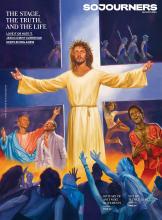One of the principal goals of My Jesus Project, a yearlong effort to better understand what we mean when we talk about following Jesus, is to practice and embody right-heartedness, or what I call “orthopathy.” I believe that, though our beliefs — orthodoxy — and our actions — orthopraxy — are important, both are anemically informed and out of balance in a Christ-like life if the so-called heart work doesn’t come first, to inform the other two.
Some of which I saw when reading prominent voices within the Southern Baptist Convention criticize Rev. Dr. Fred Craddock, known as one of the most influential voices in preaching in the past century, before his body was even in the ground. Craddock, who was 86 and had struggled with Parkinsons for a long time, died on March 7. He left behind a family, an extensive publishing library, and a nonprofit — The Craddock Center — that has done tremendous work for those trapped in poverty in Appalachia.
Two days after Craddock’s death, Jason Allen, president of Midwestern Baptist Theological Seminary in Kansas City, Mo., reduced in a blog post Craddock’s lifetime of preaching work to “a mild-mannered man encouraging mild-mannered people to be more mild-mannered” — on March 9, the day of Craddock’s funeral.
He also called Craddock’s essential claims to be “dead wrong,” claiming that it led to “no true preaching.”
Criticism of Craddock by members of the Southern Baptist Convention is not new. But there’s a big difference between lodging criticism a half dozen years before a man’s death and doing so the day of his funeral. Allen brazenly demonstrates one of the greatest dangers in what I have often called “valuing our ideology over others' humanity,” which dehumanizes and denigrates as a result.
This dehumanization does not play political or ideological favorites, either — any of us can fall prey to this trap when we hold our beliefs closer than our love of God, neighbor, and self.
Read the Full Article

